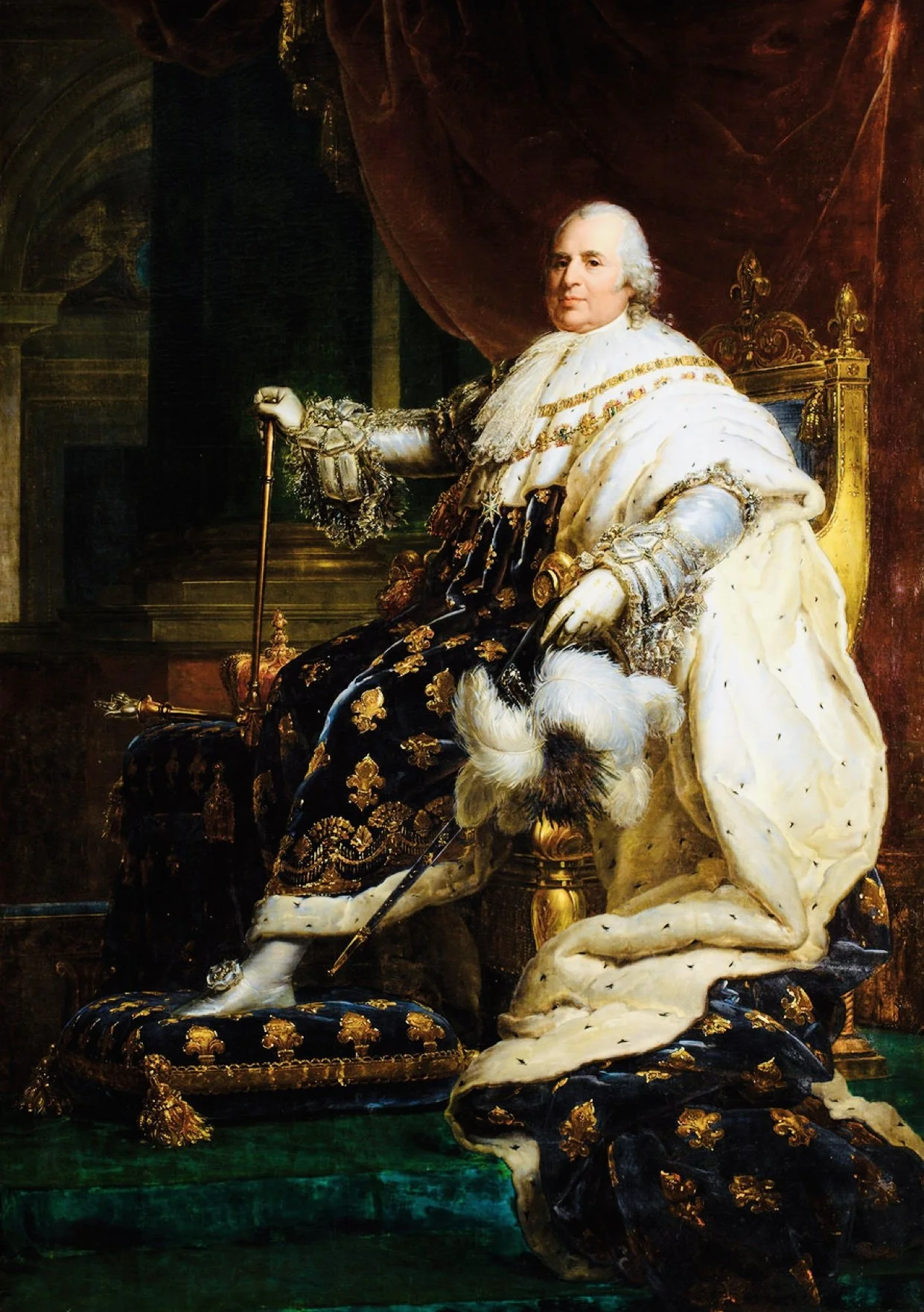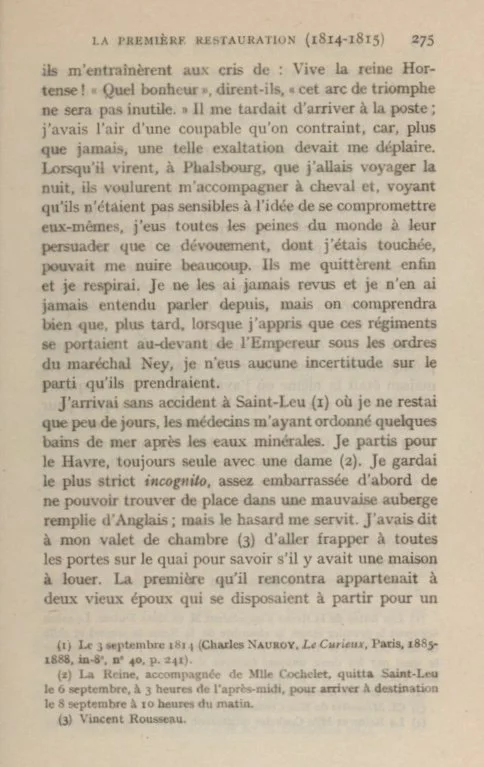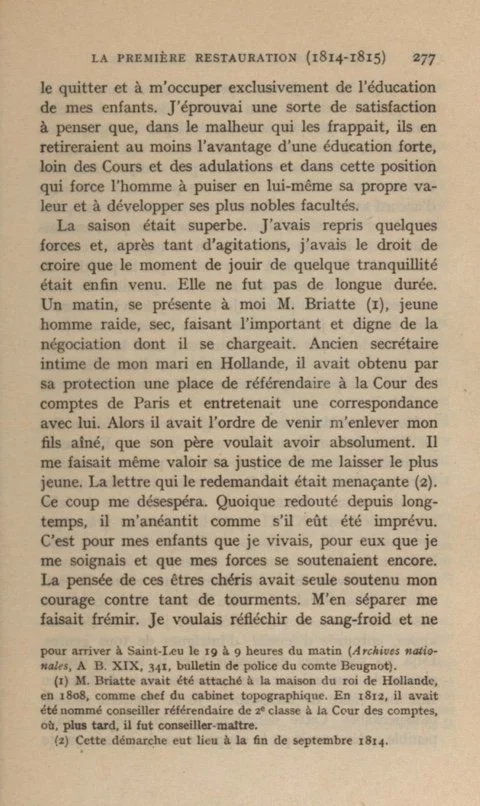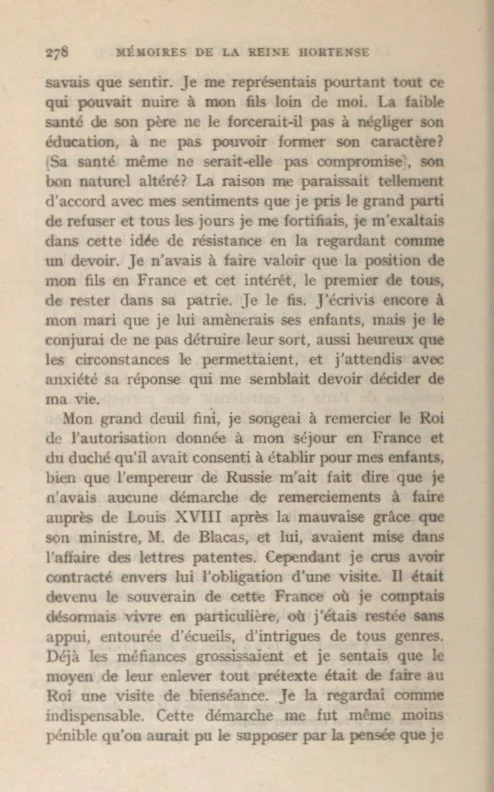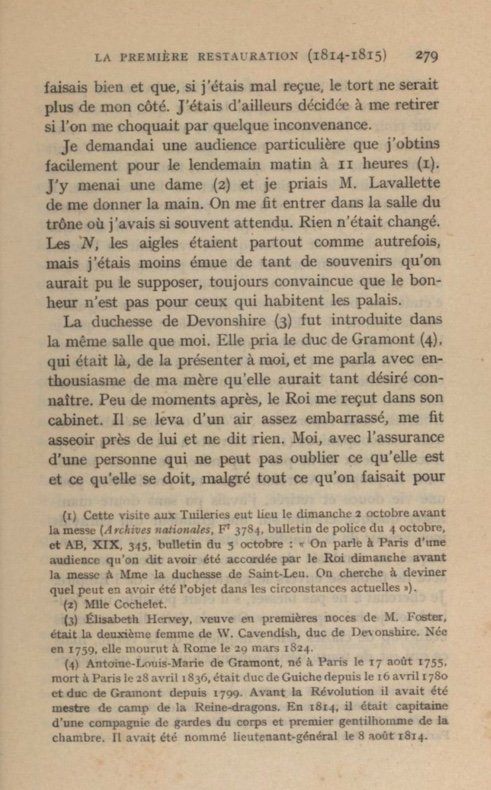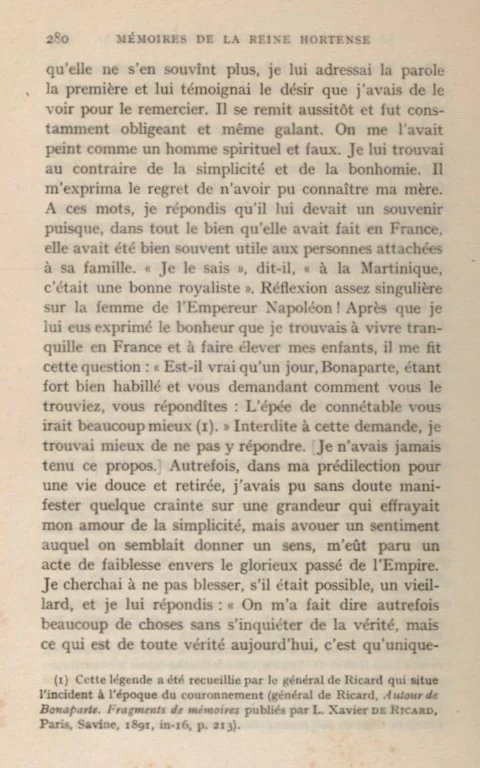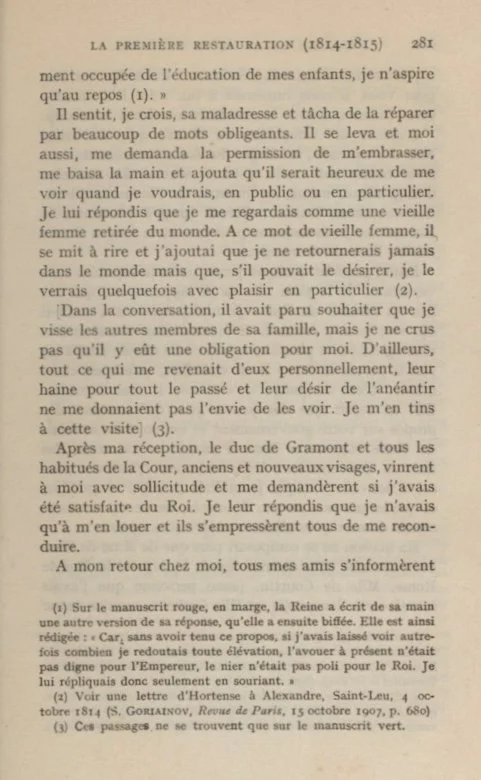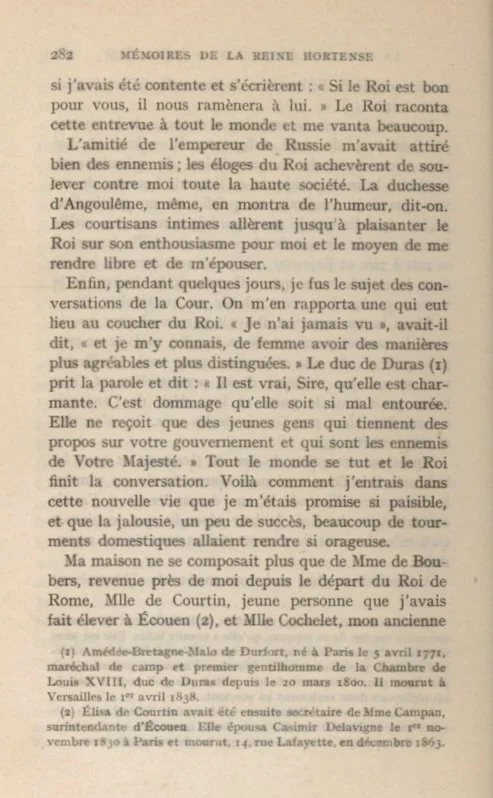Let’s have another look at Hortense’s Memoirs. If you want to read the book it is available for free at the side bar in English and French. Use the widget on the sidebar to translate the text below into pretty much any language.
This rule was a thin veneer over foreign occupation. A pattern which has played out ever since in various countries.
Hortense’s memoirs continues:
My doctors had ordered me to take some sea baths after the waters. I left for Havre, again accompanied only by one lady in waiting. I preserved the strictest incognito and was rather annoyed at first not to be able to find a room except in a second-rate inn filled with English people.
Fate, however, was kind to me. I had told my valet de chambre to go and knock at all the doors on the quay to see if there was not a house for rent. The first place he went he encountered an old couple who were about to leave for their country place and who, without knowing who I was, agreed to rent their house on my servant's word that we were respectable people.
I spent two very quiet weeks there, taking my baths, going for walks, reading, all entirely alone. One day I was invited by my landlords to take tea with them in the country. The flower-beds and drawing-room were filled with hortensias. They praised the flower and spoke of the queen after whom it had been named. I had not yet been recognized, but soon rumors of my presence caused my old couple to call.
They were deeply upset, fearing they had been frightfully impolite, and begged my pardon. I at once put them at their ease, and they informed me that this house was the one where I had lived at the age of four with my mother when she was about to sail for Martinique.
Chance had brought me back to it twenty-six years later. How many things had taken place in the meantime! How many events happy and unhappy had occurred to both my country and myself! I was even introduced to the captain who had commanded our ship.
This coincidence delighted my hosts, who had become my friends, and also struck me as curious. I returned to Saint-Leu.
This time I had decided not to leave it again, and to devote myself entirely to my children's education. I felt a sort of satisfaction at the thought that, in the midst of their misfortune, they would at least acquire a firmly grounded education far from the flatteries and distractions of the court and in a situation which required a man to depend on his own ability and to develop what talents he possessed.
The weather was marvelous. I had regained some of my strength and after so many vicissitudes felt that the time of tranquility to which I felt I was entitled had at last come. It did not last long. One morning a young man, Monsieur Briatte, presented himself.
He was stiff in his manner, abrupt in his speech, convinced of his own importance, and thoroughly suited to the negotiation which he had been instructed to carry on. Formerly my husband's private secretary in Holland, Monsieur Briatte had through his protection obtained a post as referendary at the Cours des Comptes in Paris and kept up a correspondence with his former master.
From the latter he had received orders to come and claim my elder son from me, as the boy's father insisted absolutely on their being together. He even pointed out how kind he was to leave me the younger child.
The tone of the letter which demanded that the child be turned over to Monsieur Briatte was a threatening one. This blow stunned me. Although I had feared it for a long time it fell on me as if unforeseen. My whole life revolved around my children it was for them that I sought to regain my health, for them I still struggled to keep alive.
The thought of my loved ones was the only thing that sustained me amid all my tribulations. The idea of being separated from them filled me with terror. I wished to be able to reason coolly, but my brain throbbed frantically with emotion.
I was clearly aware of all the dangers that threatened my son if he left my side. His father's poor health would result in his neglecting the child's education, and he would not know how to form his character. I
Might not even the boy's own health suffer and his natural good disposition become altered? My mind and heart were so completely at one in this dilemma that I took the grave step of refusing my husband's demands.
Daily I summoned up my will-power. Daily I fixed my mind on the idea of resisting his wishes, because I felt it was my duty to do so. It was simple enough for me to point out that my son ought to remain in France and that his personal interest lay in his staying on in his native land. I emphasized this point. I also wrote my husband that I was willing to take his children to see him.
I implored him not to ruin their future but to seek to make it as happy as possible. It was with anxiety I awaited his answer, which it seemed to me would be a question of life and death to me.
Having finished my period of deep mourning I thought of expressing my thanks to the King for having granted me permission to remain in France and for having created a duchy which my children would eventually inherit.
To be sure the Emperor of Russia had told me I should not do this in view of the hostile attitude which Louis XVIII's ministers and the King himself had shown in regard to the issuance of the letters patent.
At the same time, I felt that I owed him a visit. He had become the ruler of that France where I intended to spend the rest of my life as a private citizen, where I had no one to protect me and where I felt myself surrounded with malevolent intrigues and perils of all sorts.
Already I felt that people were looking at me with suspicion and I thought the best way to prevent their having any pretext for adopting this attitude was to pay the King a visit of courtesy.
To do this was less disagreeable to me than my friends imagined, for I felt I was doing right. If I received a cold reception the fault would not be mine. Moreover, I had decided to withdraw if anyone was in the least rude to me. I asked for a private audience. My request was granted without the least difficulty. The following morning at eleven o'clock I presented myself accompanied by a lady in waiting. I had asked Monsieur Lavallette to act as my escort.
I was ushered into the throne-room where I had so often waited in the past. Nothing had been changed. The "N's" and the eagles were everywhere. I was less troubled by so many memories than one might have thought, for then as always, I was convinced that happiness was not the lot of those who dwell in palaces.
The Duchess of Devonshire was ushered into the hall where I was. She asked the Duc de Gramont, who was also there, to introduce her to me and spoke to me enthusiastically about my mother, whom she would very much have liked to know.
A few moments later the King received me in his study. He rose as I entered, seemed rather embarrassed, asked me to sit down beside him, and said nothing.
I, with the self-confidence of a person who cannot forget who she is and what she is entitled to in spite of what anyone may do to make her forget it, opened the conversation and informed him how anxious I was to see him in order to express my thanks.
The King at once recovered and was throughout agreeable and even courtly. He had been described to me as a man who was witty but hypocritical. I found him, on the contrary, frank and kindly.
He expressed his regret at not having had the privilege of knowing my mother. To this I replied that he owed it to her not to forget her memory since, besides all the good she had done in France generally, she had frequently done favors for persons belonging to his family.
“I am aware of that," he replied "at Martinique she was an excellent royalist." Rather an odd remark to make about the wife of Emperor Napoleon! After I had told him how happy I was to live quietly in France and to bring up my children there, he suddenly asked this question:
“Is it true that one day when Bonaparte was particularly well dressed and asked you what you thought of his uniform you answered, `The sword of the Constable of France would be much more becoming to you?"
Astonished at this query I thought it best not to reply. As a matter of fact, I had never made this remark. Formerly, owing to my preference for a quiet, calm life, I had doubtless at some time or other expressed my alarm at a rank which displeased my taste for simplicity, but to admit an impression which people might interpret as a criticism seemed to me to be disloyal toward the Empire.
I sought some way of not offending an elderly man and answered : "Many words were attributed to me in the past without people taking the pains to find out whether they were true or not, but one thing is certainly true today, namely, that completely absorbed by the education of my children the only thing I desire is a retired life."
He felt, I fancy, that he had made an unfortunate remark and sought to remedy it by saying a great many agreeable things. He finally rose; I did likewise. He asked permission to embrace me, kissed my hand, and added that he would always be glad to see me, whether in public or private.
I answered that I considered myself an old woman who had withdrawn from society. The expression of "old woman" made him laugh. I added that I had no intention of going out in society any more, but if he wished it, I should be glad to see him occasionally informally.
During the conversation he seemed to wish to have me meet other members of his family, but I did not feel that it was obligatory for me to do so. Moreover, everything that I had heard about them, their personalities, their past and their efforts to efface it did not make me at all anxious to see them.
I thought that this one visit was enough. After my reception by the King, the Duc de Gramont and the other members of court circles, some of whom I knew and some of whom were new to me, came up and asked if I had been satisfied with my reception. I replied I had every reason to be pleased, and they all conducted me back to my carriage.
When I returned home all my friends inquired if I was pleased with my interview and exclaimed, "If the King is kind to you, we shall all rally to him!" The King told everyone about our conversation and praised me highly.
The friendship of the Emperor of Russia had already made me many enemies. The praises of the King completed the hostility which all the prominent people in society felt toward me. It was said that the Duchesse d’Angoulême herself did not conceal her displeasure.
The favorite courtiers even went so far as to tease the King about his liking for me and the means by which I might become free to marry him. At any rate for several days I formed the chief topic of conversation at court.
Certain remarks were repeated to me. The King had said: "I never met a woman, and I have known a great many, who was more distinguished in her bearing, more agreeable in her manners."
To this the Duc de Duras replied: "It is true, Sire, she is charming. It is a pity she is so ill-advised by her friends. Her only intimates are young men who criticize your government and are your Majesty's personal enemies."
Everyone was silent and the King did not continue the conversation. This was the beginning of that new life, which I intended to be so peaceful and which jealousy, a little social success, many domestic troubles were about to make so stormy.
The original French is available below:

